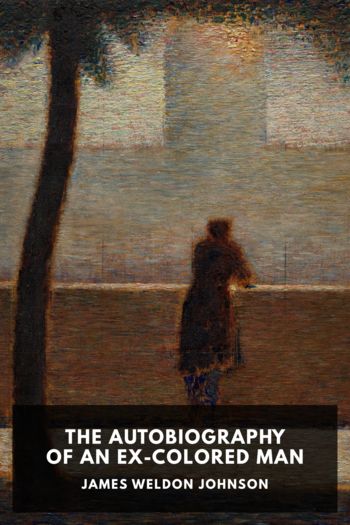The Autobiography of an Ex-Colored Man - James Weldon Johnson (best classic books of all time txt) 📗

- Author: James Weldon Johnson
Book online «The Autobiography of an Ex-Colored Man - James Weldon Johnson (best classic books of all time txt) 📗». Author James Weldon Johnson
As soon as we landed, four of us went directly to a lodging house in 27th Street, just west of Sixth Avenue. The house was run by a short, stout mulatto man, who was exceedingly talkative and inquisitive. In fifteen minutes he not only knew the history of the past life of each one of us, but had a clearer idea of what we intended to do in the future than we ourselves. He sought this information so much with an air of being very particular as to whom he admitted into his house that we tremblingly answered every question that he asked. When we had become located, we went out and got supper, then walked around until about ten o’clock. At that hour we met a couple of young fellows who lived in New York and were known to one of the members of our party. It was suggested we go to a certain place which was known by the proprietor’s name. We turned into one of the cross streets and mounted the stoop of a house in about the middle of a block between Sixth and Seventh Avenues. One of the young men whom we had met rang a bell, and a man on the inside cracked the door a couple of inches, then opened it and let us in. We found ourselves in the hallway of what had once been a residence. The front parlor had been converted into a bar, and a half-dozen or so well-dressed men were in the room. We went in and after a general introduction had several rounds of beer. In the back parlor a crowd was sitting and standing around the walls of the room watching an exciting and noisy game of pool. I walked back and joined this crowd to watch the game, and principally to get away from the drinking party. The game was really interesting, the players being quite expert, and the excitement was heightened by the bets which were being made on the result. At times the antics and remarks of both players and spectators were amusing. When at a critical point a player missed a shot, he was deluged, by those financially interested in his making it, with a flood of epithets synonymous with “chump”; while from the others he would be jeered by such remarks as “Nigger, dat cue ain’t no hoe-handle.” I noticed that among this class of colored men the word “nigger” was freely used in about the same sense as the word “fellow,” and sometimes as a term of almost endearment; but I soon learned that its use was positively and absolutely prohibited to white men.
I stood watching this pool game until I was called by my friends, who were still in the barroom, to go upstairs. On the second floor there were two large rooms. From the hall I looked into the one on the front. There was a large, round table in the center, at which five or six men were seated playing poker. The air and conduct here were greatly in contrast to what I had just seen in the poolroom; these men were evidently the aristocrats of the place; they were well-, perhaps a bit flashily-, dressed and spoke in low modulated voices, frequently using the word “gentlemen”; in fact, they seemed to be practicing a sort of Chesterfieldian politeness towards each other. I was watching these men with a great deal of interest and some degree of admiration when I was again called by the members of our party, and I followed them on to the back room. There was a doorkeeper at this room, and we were admitted only after inspection. When we got inside, I saw a crowd of men of all ages and kinds grouped about an old billiard table, regarding some of whom, in supposing them to be white, I made no mistake. At first I did not know what these men were doing; they were using terms that were strange to me. I could hear only a confusion of voices exclaiming: “Shoot the two!” “Shoot the four!” “Fate me!” “Fate me!” “I’ve got you fated!” “Twenty-five cents he don’t turn!” This was the ancient and terribly fascinating game of dice, popularly known as “craps.” I myself had played pool in Jacksonville—it is a favorite game among cigar makers—and I had seen others play cards; but here was something new. I edged my way in to the table and stood between one of my newfound New York friends and a tall, slender, black fellow, who was making side bets while the dice were at the other end of the table. My companion explained to me the principles of the game; and they are so simple that they hardly need to be explained twice. The dice came around the table until they reached the man on the other side of the tall, black fellow. He lost, and the latter said, “Gimme the bones.” He threw a dollar on the table and said, “Shoot the dollar.” His style of play was so strenuous that he had to be allowed plenty of room. He shook the dice high above his head, and each time he threw them on the table, he emitted a grunt such as men give when they are putting forth physical exertion with a rhythmic regularity. He frequently whirled completely around on his heels, throwing the dice the entire length of the table, and talking to them as though they were trained animals. He appealed to them in short singsong phrases. “Come, dice,” he would say. “Little Phoebe,” “Little Joe,” “ ’Way





Comments (0)